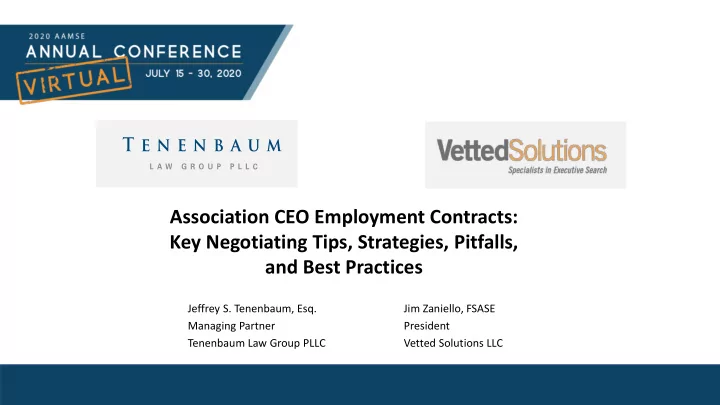

Association CEO Employment Contracts: Key Negotiating Tips, Strategies, Pitfalls, and Best Practices Jeffrey S. Tenenbaum, Esq. Jim Zaniello, FSASE Managing Partner President Tenenbaum Law Group PLLC Vetted Solutions LLC
Association CEO Employment Contracts Four Key Elements • Term (including renewal provisions, typical term is 2-5 years) • Termination (including severance pay, definition of “cause,” etc.) • Compensation and Benefits (including annual pay increases and bonuses, who does CEO report to, who conducts CEO’s annual performance evaluation, and who sets CEO’s salary and bonuses?, structuring benefits to be non-taxable or tax-deferred to CEO, more expansive benefits than for other staff (e.g., deferred comp, added life insurance, car allowance, certain first-class travel, social or health club dues, companion travel expenses), comparability analysis to ensure fair market value, etc.) • Authority and Responsibility (CEO should have sole and exclusive authority for the hiring, firing, supervision, promotion, and compensation of all other association staff, subject to budgetary parameters set by the Board)
Term of the Agreement • Initial Term – The association and executive should consider the ways the term can end prior to its expiration • Termination with cause (definition of “cause” is critical) • Termination without cause (usually with severance pay) • Termination by executive (notice period specified) • Other (e.g., disability of the executive) • Renewal Term – All agreements should specify what happens at the end of the initial term, and how the renewal term can end prior to its expiration • Possible scenarios at the end of the initial or renewal term: • Expiration (with or without severance pay)(potentially followed by new negotiated contract) • Automatic Renewal • Notice (both parties usually want such a provision included)
Compensation • Salary – Typically specified with provisions for future upward adjustments • Associations should be cautious about specifying guaranteed or minimum increases, but executives generally push for them; specify no decrease in annual salary • Critical to spell out the process for the annual performance evaluation, and who will conduct the evaluation (generally preferable to have the executive committee serve such function) • Bonus – Should be tied to the attainment of mutually agreed-upon and yet-to-be specified goals • The agreement should specify that other factors may be considered • The agreement should spell out the process for setting the goals and determining the bonus amount, and who will serve such function (e.g., executive committee) • Long-term incentive plan
Compensation • Employee benefits (e.g., medical and dental insurance, life insurance, fringe benefits, car allowance) – taxable or not? Certain benefits are subject to specific disclosure on the IRS Form 990 (e.g., first-class or charter travel, social or health club dues, companion travel, housing allowance, personal services, tax indemnification and gross-up payments) • Retirement plans • Deferred compensation – Be aware of Internal Revenue Code Section 409A • Total compensation (must be “reasonable” compared to similarly situated organizations) • Cannot exceed fair market value • Potential IRS penalties – Risk can be mitigated by using the “rebuttable presumption of reasonableness” • Compensation from affiliated organizations
Other Typical Contract Terms • Conflicts of interest • Ability to serve on nonprofit and/or corporate boards; outside employment • Professional development • Travel and other business expenses • Non-competition • Non-solicitation of employees, sponsors, exhibitors, donors, etc. • Paid Time Off (more than other staff; ability to rollover; payout upon departure?) • Sabbatical after certain number of years of service • Relocation allowance • Legal fee reimbursement for negotiation of employment agreement (usually subject to a cap) • Indemnification • Dispute resolution (e.g., arbitration, mediation (e.g., mandatory non-binding mediation for certain types of claims), loser pays legal fees)
Questions? • Jeffrey S. Tenenbaum, Esq. Managing Partner Tenenbaum Law Group PLLC 1101 K Street, NW, Suite 700 Washington, DC 20005 +1.202.221.8002 jtenenbaum@TenenbaumLegal.com • Jim Zaniello, FASAE President Vetted Solutions LLC Washington, DC • Chicago, IL • Los Angeles, CA +1.202.544.4749 jim.zaniello@VettedSolutions.com
Recommend
More recommend